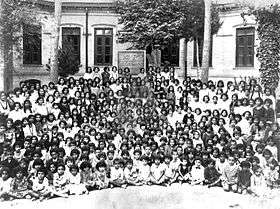Socio-economic development (Bahá'í)

Since its inception the Bahá'í Faith has had involvement in socio-economic development beginning by giving greater freedom to women,[1] promulgating the promotion of female education as a priority concern,[2] and that involvement was given practical expression by creating schools, agricultural coops, and clinics.[1]
History
The accelerated growth of the worldwide community in the 1960s-1980s expanded it with a large number of poor, illiterate villagers and tribal peoples in India, Africa and South America, which meant an enormous challenge for the social and economic development of communities. According to the Bahá'í teachings, development should increase people’s self-reliance, communal solidarity, giving access to knowledge, and, where possible, removing sources of injustice. Spiritual, moral and material development should be linked together.[3] These priorities are envisioned as crucial to the development of world peace.
The religion entered a new phase of activity when a message of the Universal House of Justice dated 20 October 1983 was released.[4] The Office of Social and Economic Development was established[5] and Bahá'ís were urged to seek out ways, compatible with the Bahá'í teachings, in which they could become involved in the social and economic development of the communities in which they lived. Worldwide in 1979 there were 129 officially recognized Bahá'í socio-economic development projects. By 1987, the number of officially recognized development projects had increased to 1482.[4]
In time with the release of the Universal House of Justice's release of its statement The Promise of World Peace, it also sent a letter of all national assemblies to specify goals for the community for the International Year of Peace.[6] These goals included sponsoring activities about the theme of peace which is a priority of the religion: to engage the attention of people to relevant topics related to peace (often related matters of justice and development), a publicity campaign encouraging these goals, publishing new literature, and already existing serial publications on the subject, Bahá'í radio stations to devote programming on it, the Association for Bahá'í Studies to devote scholarly activities on it, the encouragement of artists and musicians in their contribution and that they should invite colleagues to the work.
Statistics
The Baha'i department of statistics released the following summary of projects accomplished:[7]
| Programs | World | Africa | Americas | Asia | Australasia | Europe |
|---|---|---|---|---|---|---|
| Education (tutorial/academic/other) | 732 | 169 | 115 | 427 | 13 | 8 |
| Health & Social Services | 78 | 28 | 14 | 25 | 2 | 9 |
| Radio Stations | 5 | 0 | 5 | 0 | 0 | 0 |
| Agriculture & Forestry | 74 | 35 | 13 | 20 | 5 | 1 |
| Community Development | 358 | 60 | 266 | 12 | 7 | 13 |
| Total | 1247 | 292 | 413 | 484 | 27 | 31 |
Some particular examples
- About 300 people attended a symposium on "Peace Through a New Consciousness" sponsored in Mannheim by the Baha'i Club at the local university. A panel of distinguished speakers took part including the head of the faculty of social work at Heidelberg, a cultural editor for German television, and a political journalist.[8]
- A "World Peace Conference" sponsored by the National Spiritual Assembly of India was held January 19 in New Delhi. Planned as an observance of the International Year of Peace and as a tribute to the late Dr. Martin Luther King Jr., the conference served also as a means of introducing the Universal House of Justice's peace statement to many of India's eminent personages and to a large gathering of university students. Special guest speaker was Nagendra Singh, then president of the International Court of Justice.[9] The audience of more than 550 overflowed the Vigyan Bhavan Conference Hall, a prestigious site for international gatherings.
- The Local Youth Committee of Karachi, Pakistan, held a symposium on "Youth and World Peace" at the Baha'i Hall in Karachi. Among the speakers were then Senator Javed Jabbar.[10]
- The 11th annual Conference of the Association for Baha'i Studies, held August 20–24 at the University of Western Ontario in London, Ontario, Canada, was the largest such gathering to date with about 2,000 adults taking part was focused on the theme "Beyond the Quest for Peace: Creating a New World Order".[11] Speakers included Hand of the Cause Rúhíyyih Khanum, then Continental Counselor Adib Taherzadeh, music and presentations by Dr. Ervin László and others. It was followed by a Native American peace pipe ceremony, in which Ruhiyyih Khanum, Dr. and Mrs. Laszlo, and other dignitaries took part.
- The Bahá'í International Community, an international non-governmental organization, maintains a presence devoted to supporting and coordinating socio-development activities at the United Nations as well as presenting papers and reports of activities of the religion to UN agencies on themes of development and peace.[12]
Other examples of short-term projects are health camps, training seminars, tree-planting and environmental clean-up projects. Long-term projects include literacy, health care, agricultural and environmental projects. Most of the projects are schools, which range from village tutorial schools to large secondary schools, and some universities.[3]
Bahá'ís and interested parties have participated in an annual conference since 1999 sponsored by the Rabbani Charitable Trust in Orlando Florida.[13] Mildred Mottahedeh gave nearly all her wealth away by establishing charities such as the Mottahedeh Development Services. The Bahá'í Chair for World Peace is located at the Center for International Development and Conflict Management under the auspices of the College of Behaviorial and Social Sciences at the University of Maryland.[14]
Some larger scale recent examples of Baha'i-inspired socio-economic projects are FUNDAEC, the Tahirih Justice Center, Barli Development Institute for Rural Women, Nur University, and the Dawn Breakers International Film Festival.
See also
- Bahá'í Faith by country
- Bahá'í radio
- Bahá'í school
- Bahá'í Faith and gender equality
- Huqúqu'lláh
- Ruhi Institute: Releasing the Powers of Junior Youth
References
- 1 2 Momen, Moojan. "History of the Baha'i Faith in Iran". draft "A Short Encyclopedia of the Baha'i Faith". Bahai-library.com. Retrieved 2009-10-16.
- ↑ Kingdon, Geeta Gandhi (1997). "Education of women and socio-economic development". Baha'i Studies Review. 7 (1).
- 1 2 Momen, Moojan (2007). "The Bahá'í Faith". New Lion Handbook: The World's Religions. Oxford: Lion Hudson Plc. p. 464. ISBN 978-0-7459-5266-6.
- 1 2 Momen, Moojan; Smith, Peter (1989). "The Baha'i Faith 1957–1988: A Survey of Contemporary Developments". Religion. 19: 63–91. doi:10.1016/0048-721X(89)90077-8.
- ↑ Smith, Peter (2008). An Introduction to the Baha'i Faith. Cambridge University Press. ISBN 978-0-521-86251-6.
- ↑ "Make plans now for 'Peace Year 1986'". Bahá'í News. No. 648. March 1985. p. 1. ISSN 0195-9212.
- ↑ "Baha'i Social and Economic Development Programs". Bahá'í News. No. 668. November 1986. p. 13. ISSN 0195-9212.
- ↑ "Germany proclaims message of peace". Bahá'í News. No. 662. May 1986. p. 12. ISSN 0195-9212.
- ↑ "India hosts 'World Peace Conference'". Bahá'í News. No. 662. July 1986. p. 12. ISSN 0195-9212.
- ↑ "Around the World; Pakistan". Bahá'í News. No. 662. October 1986. p. 14. ISSN 0195-9212.
- ↑ "Association's 11th annual Conference". Bahá'í News. No. 662. December 1986. p. 8. ISSN 0195-9212.
- ↑
- Preparation for Life in Peace: The Contribution of Women, by the Bahá'í International Community, as the written version of an oral statement to the European Regional Seminar for the International Year of Peace, 6 May 1985, Vienna, Austria
- Peace and Development, by the Bahá'í International Community, as a Statement to the United Nations International Year of Peace Seminar for the Asia and Pacific and Western Asia Regions, 20 May 1985, Bangkok, Thailand
- Preparation for Life in Peace: The Role of Youth, by the Bahá'í International Community as a Statement to the International Year of Peace Seminar for the Asia, Pacific and Western Asia Regions, 20 May 1985
- Statement on the Year of Peace, by the Bahá'í International Community, as a Statement to the Fifth session of the South Pacific Commission (SPC) Committee of Representatives of Governments and Administrations (CARGA), Noumea, New Caledonia, 26–30 May 1986
- ↑ "Social and Economic Development Conference History". Rabbani Charitable Trust. Retrieved 2012-11-04.
- ↑ "The Baha'i Chair for World Peace". The Baha'i Chair for World Peace. 2015. Retrieved 2015-06-01.
Further reading
- Arbab, Farzam (2000). "Promoting a Discourse on Science, Religion, and Development". In Harper, Sharon. The Lab, the Temple, and the Market. Ottawa, ON, Canada: International Development Research Centre. ISBN 0889369208.
External links
- Bahai.org: Social and Economic Development
- Canadian Bahá'í International Development Agency (CBIDA)
- Institute for Studies in Global Prosperity (ISGP)
